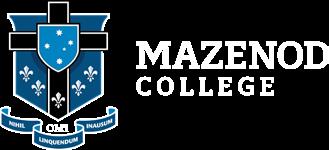

Health Centre Induction
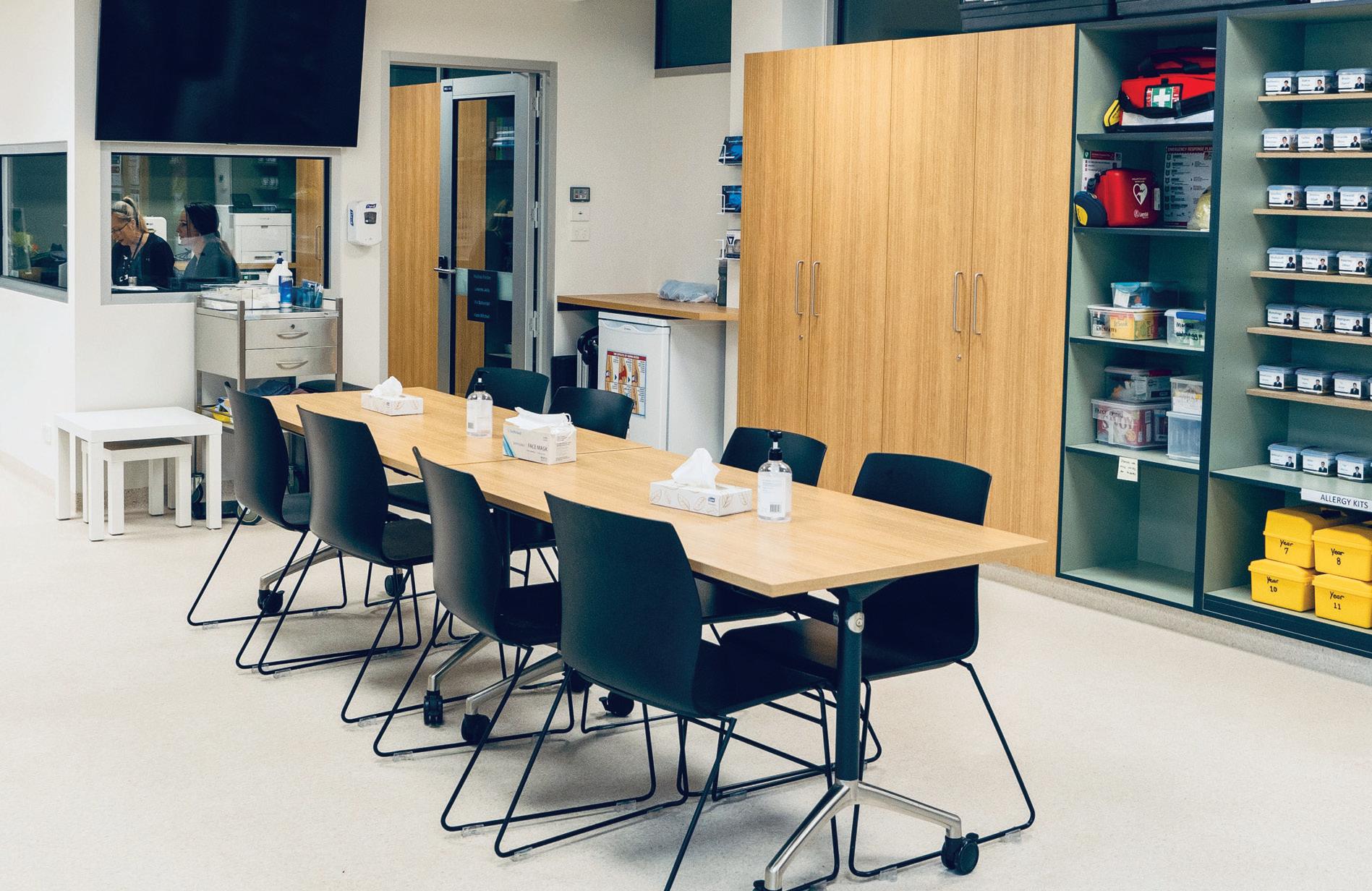
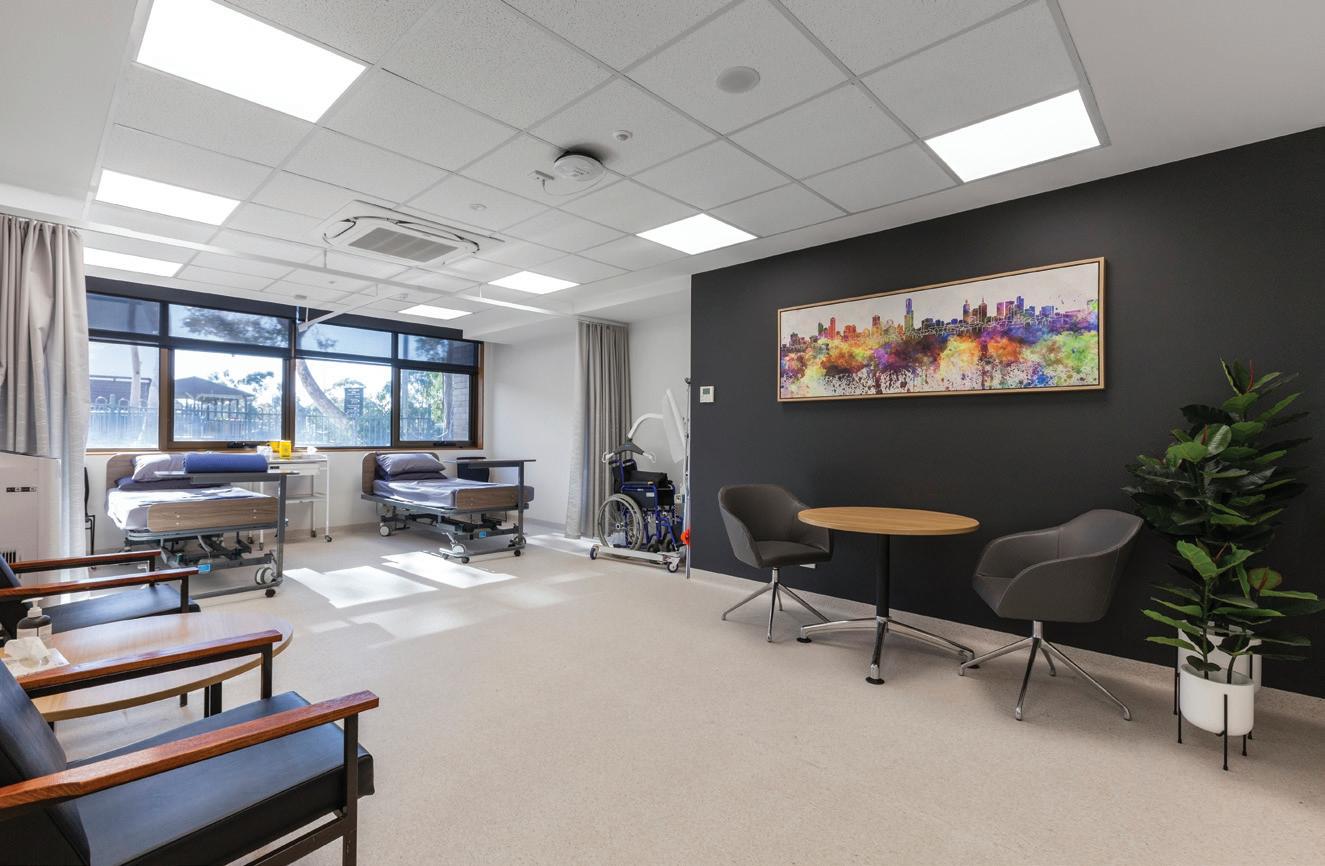
Registered Nurses
Nadine Forder, Vivienne Schembri, Leanne Jelly & Kate Mitchell
(03) 8561 1159 | Monday - Friday 8:30 AM - 3:30 PM
ON SITE CARE
The Health Centre is never locked, even after hours.
All new staff are encouraged to familiarise themselves with the Health Centre in the case of an emergency.
The Mazenod College Health Centre is staffed daily by two Division 1 Registered Nurses who all have extensive experience in emergency nursing. The Health Centre aims to be an open and friendly place which encourages good communication between students, staff and families.
If for some reason you need to obtain access to the locked Health Centre cupboards after hours, a spare key is located in the office of the Executive Assistant to the Vice Principal. If access to the nurses office is required after hours please contact the Principal, a Deputy Principal, Maintenance staff or the Business Manager.
Any student who is unwell or injures themselves at school must be assessed by a nurse during school hours.
At all other times the supervising teacher is responsible for management. Students should not be left unattended in the Health Centre.
Do not send a student to the Health Centre alone if they are unwell.
Please ensure they are escorted to the Health Centre by a staff member or a responsible student.
On arrival in the Health Centre, the students’ attendance is documented in Synergetic. This will enable staff to check the location of the student. There may be some delay in documenting their arrival, so if you are concerned please call the Health Centre on (03) 8561 1159 as we may not receive or be able to respond to emails until later.
If there are any students whom you think might misuse the system, please advise the nurses.
Do not allow a student to travel home alone or on public transport if they are unwell, or have sustained a significant injury.
Encourage the students’ parent/guardian to collect them. If they are unable to collect the student, encourage them to organise someone else. Please ensure that a staff member remains with the student until they are collected.
OFF SITE CARE
If a student injures themselves or becomes unwell out of Health Centre hours, please follow the below recommendations.
If any medication (Salbutamol (Ventolin/Asmol), EpiPen, Anti-histamine) is administered please document the time and dosage given.
Notify the students’ parents/guardians.
Complete a Mazenod College injury report as soon as possible, and submit it to the nurses. Blank reports are contained in each First Aid kit, or are available from the nurses during staffed hours.
For serious injuries and/or life threatening illness where urgent care is required, please call an ambulance on 000 and follow the instructions provided.
MEDICATION MANAGEMENT
For safety reasons, all medications must be kept in the Health Centre, rather than carried by students. This prevents potentially dangerous medication falling into the wrong hands, incorrect dose being taken, or being used by students to ‘treat’ other students.
The exceptions to this are any inhalers for asthmatics, insulin for diabetics (only after consultation with nurses & parents), EpiPens for anaphylaxis risk, and anti-histamine tablets for allergies.
As per MACS procedures, a Medication Administration Form is required to be completed by a GP prior to any prescription medication being administered at school. Parents may give consent for students to be administered over the counter medication on a short term basis by completing a Medication Administration Form.
Students who require regular medication while at school must present to the Health Centre to have their medication administered by the nurses. Students are not permitted to store medication in their schools bags or lockers (excluding medication for asthma, anaphylaxis, diabetes and allergies). Any medications that are required to be administered while off campus on an excursion or camp must be handed to the supervising teacher at the start of the event. They must be clearly labelled, in their original packaging, and be accompanied by a Medication Administration Form that has been signed by a GP.
If a student has regular medication that is usually stored in the Health Centre, an extra dose must be brought from home for any off campus event.
No staff member is permitted to administer any medication, including over the counter medication, without a signed form. This excludes emergency medication for asthma, anaphylaxis and allergies.
EMERGENCY CARE AND FIRST AID
Specialised generaluse emergency action kits for Anaphylaxis, Asthma, and Diabetes are kept just inside the Health Centre’s main door.
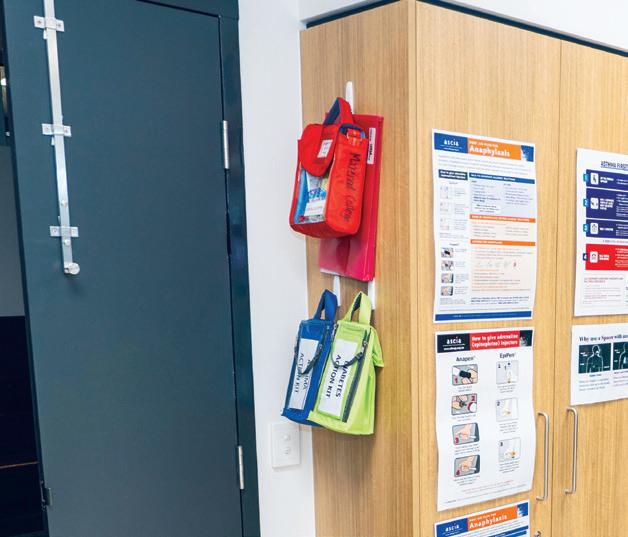
We have additional kits located around the school.
Reception
Provence Centre (inside staff office)
Founders Complex Food Technology Kitchen
O’Rourke building (upstairs between co-ordinators offices)
Chapel (in Sacristy)
Canteen
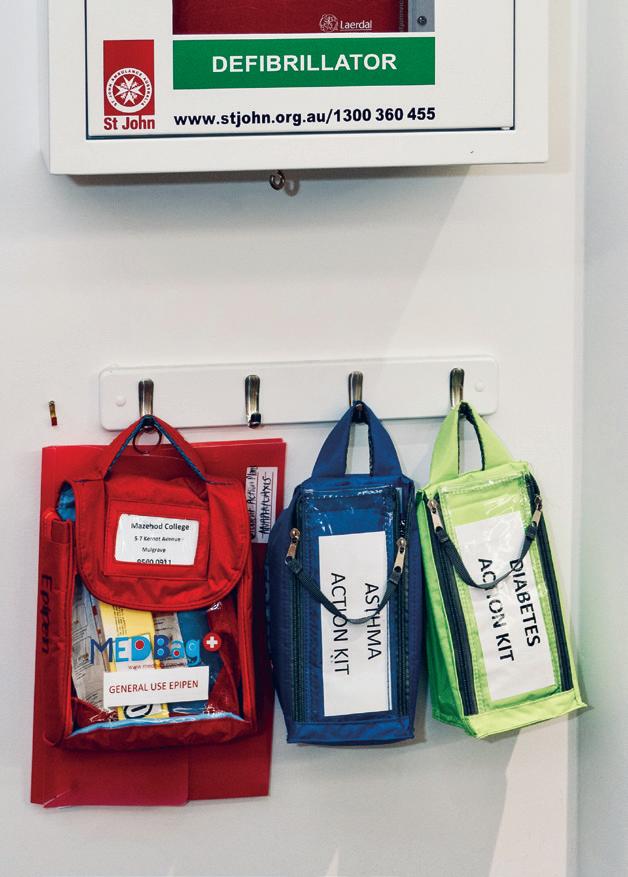
These are all for general use. For example, use these when a student’s own action kit or medication is not readily available, or to treat an undiagnosed condition such as firsttime anaphylaxis.
EMERGENCY CARE AND FIRST AID
Automated External
Defibrillators
(AEDs) are located in a number of easily accessible locations.
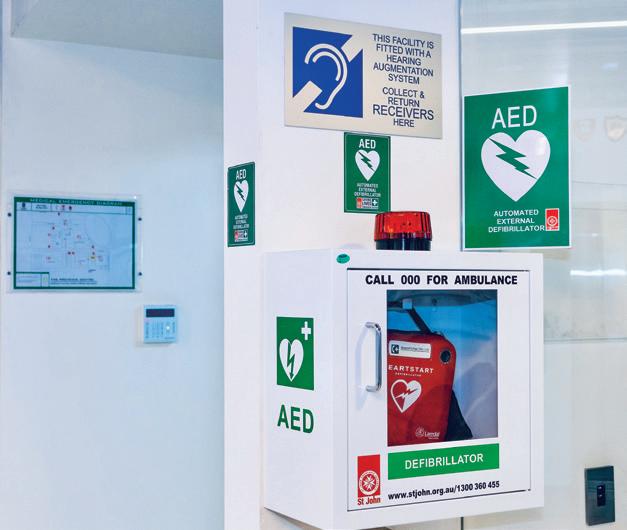
Health Centre
Provence Centre
Founders Complex
Chapel (in Sacristy)
O’Rourke Building (upstairs between the co-ordinators offices).
All
of Mazenod’s AEDs are Heartstart defibrillators.
There are two different
but the basic operation is the same.
models,
The only difference is that the FRX model in the Health Centre has a pink ‘paediatric key’. If this key is inserted into the designated slot, it can be used on children under 8 years old (<25 kg).
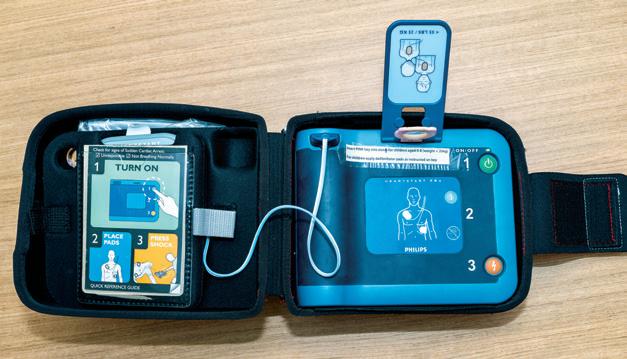
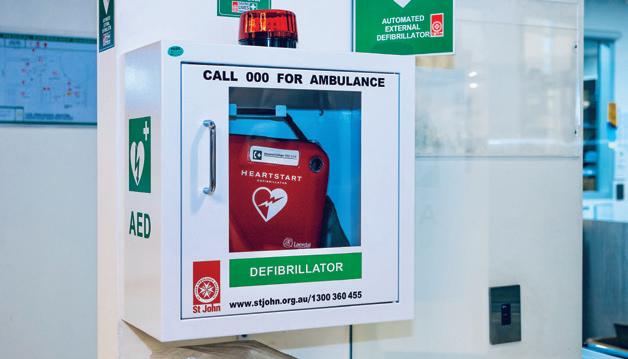
Heartstart FRX Model
Heartstart HS1 Model
EMERGENCY CARE AND FIRST AID
The AED’s in the Provence Centre, Founders Complex and O’Rourke Building are kept in an alarmed cabinet.
The alarm (very loud) will sound the minute the door is opened and cannot be silenced by simply closing the door. This is to prevent the AED’s going missing in buildings that are often used out of hours.
In order to silence the alarm, there is a pin kept under the door ledge. This must be inserted into the red alarm mechanism on the left-hand side of the cabinet. It should be removed and placed back under the ledge once the alarm has ceased.
Please do not make this information available to students or members of the public.
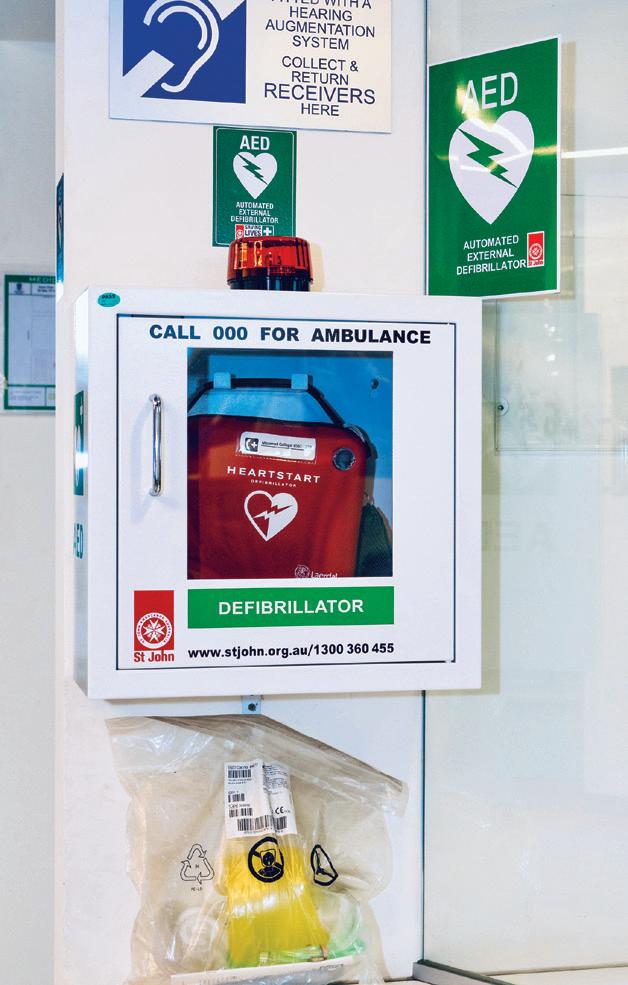
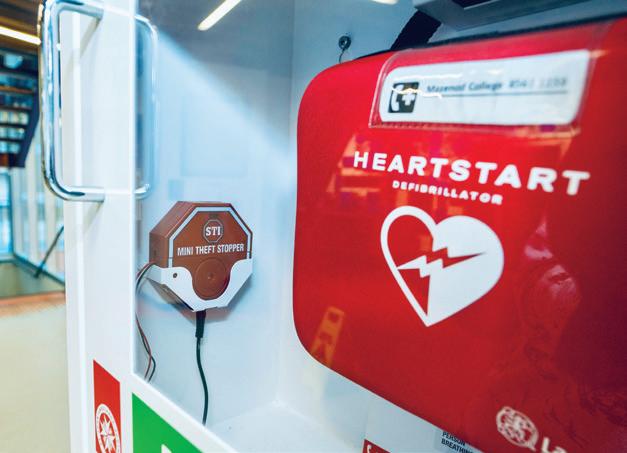
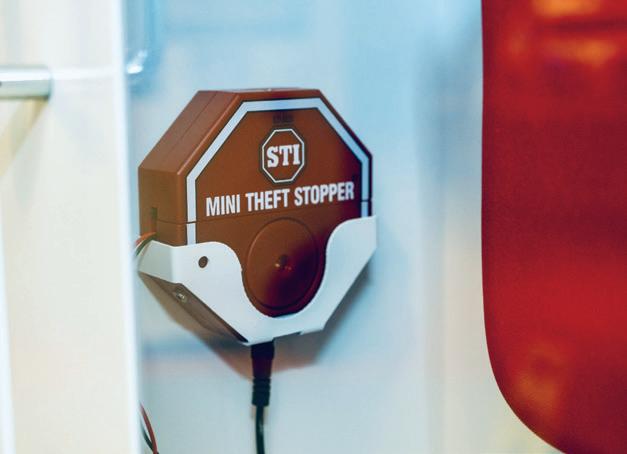
EMERGENCY CARE AND FIRST AID
In the case of an emergency medical situation, all staff members are able to use the defibrillator by turning on the machine and following the verbal prompts.
Please speak to the nurses for advice on how to receive education, and to familiarise yourself with the machines.
Medical Emergency Map
This map can be found in the vicinity of every AED and evacuation plan, and reveals the location of each AED & general-use EpiPen on site. It also shows the closest gate number, so an ambulance can be directed to the most appropriate gate in the case of an emergency.
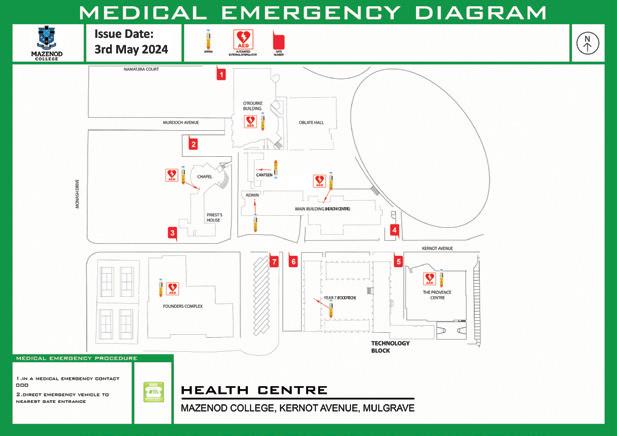
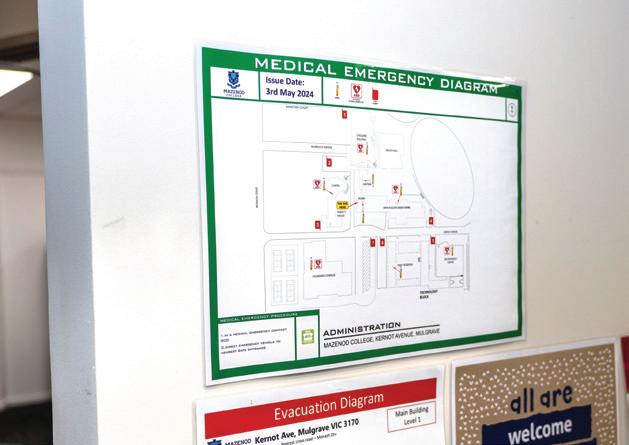
EMERGENCY CARE AND FIRST AID
A silver trolley in the Health Centre’s entrance contains most of the basic First Aid items that you will require.
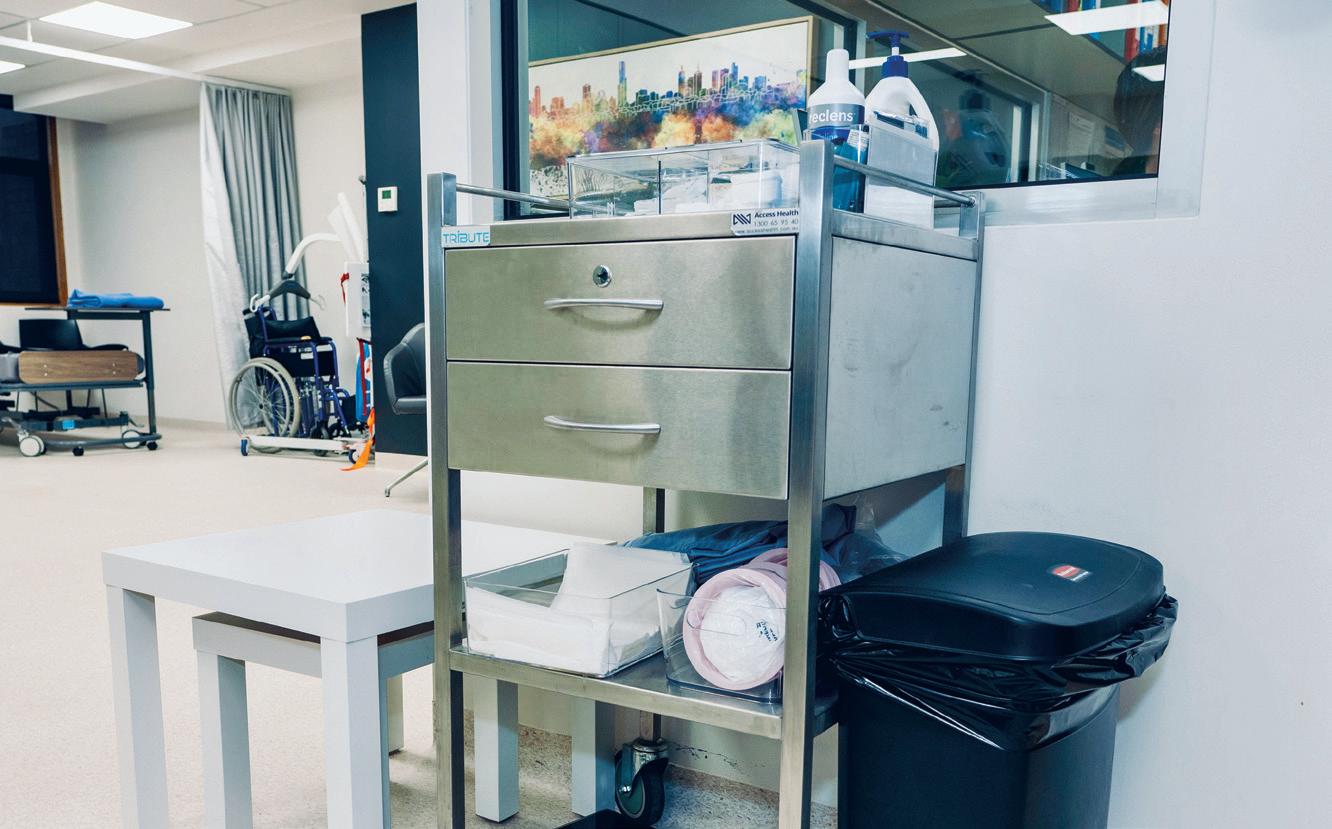
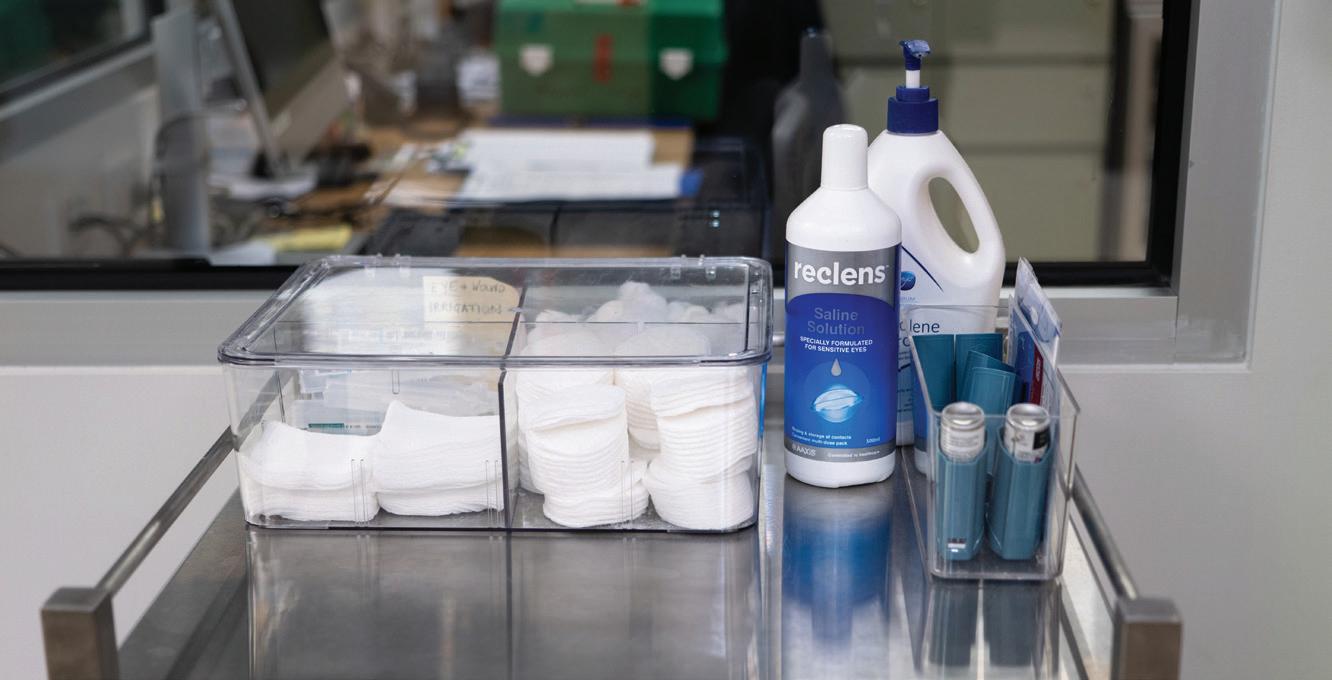
EMERGENCY CARE AND FIRST AID
First Aid kits must be taken whenever students are taken off campus. It is the teachers’ responsibility to notify the nurses and organise to collect it.
Please give the nurses plenty of notice as there are occasions when the kits are in high demand and we many have to make up additional kits.
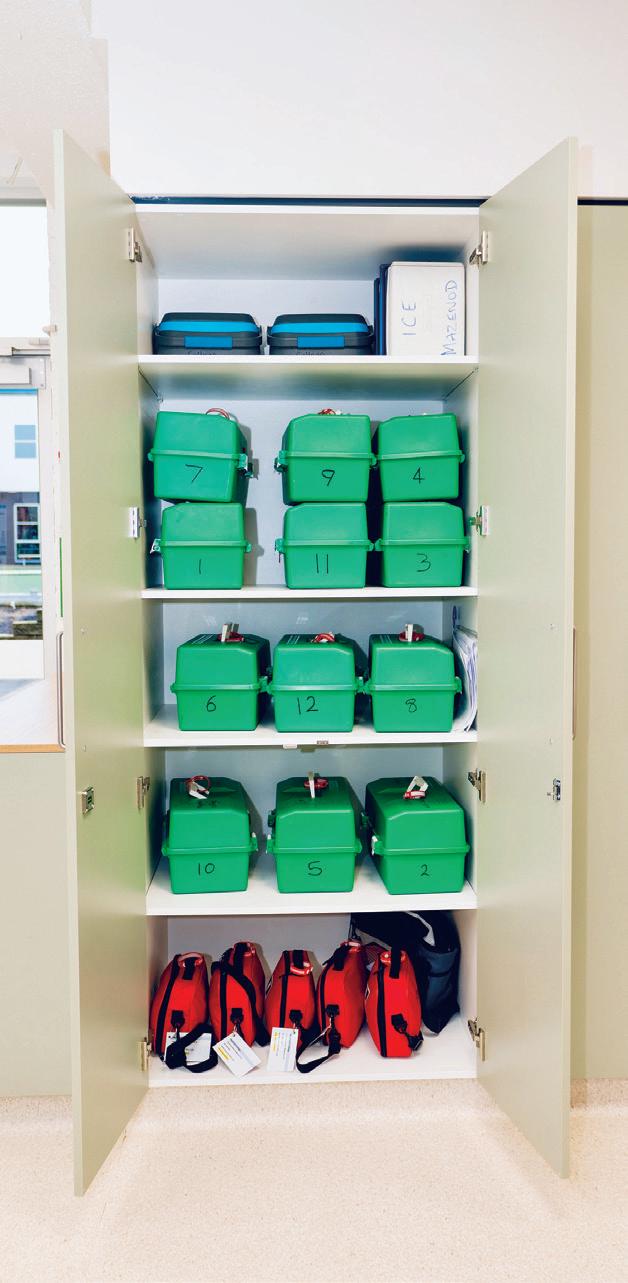
Kits provided to staff will contain an EpiPen.
A Mazenod College Injury Form is to be completed as soon as possible for all First Aid provided to a student, and handed to the nurses upon returning to school.
Anaphylaxis Action Kits
Every student who has a history of anaphylaxis is required under Ministerial Order 706 to have a personal action kit at school. School policy also requires an action kit for students with a history of an allergy. These kits are kept in the Health Centre.
Each student who is at risk of Anaphylaxis will have their EpiPen (Adrenaline Auto Injector) along with their personalised action plan kept in the Health Centre in an individual container. These containers are labelled with the student’s name and photo and stored in alphabetical order.
Each student is also required to have a second anaphylaxis kit (home kit) that is kept in their school bag. This is the kit that must be taken with them for any off-campus activities. A student must not be allowed to board a bus without this kit being sighted by the teacher in charge. If the student does not have his home kit, then he must be sent to the Health Centre to collect his school kit. This must be returned immediately upon returning back to school.
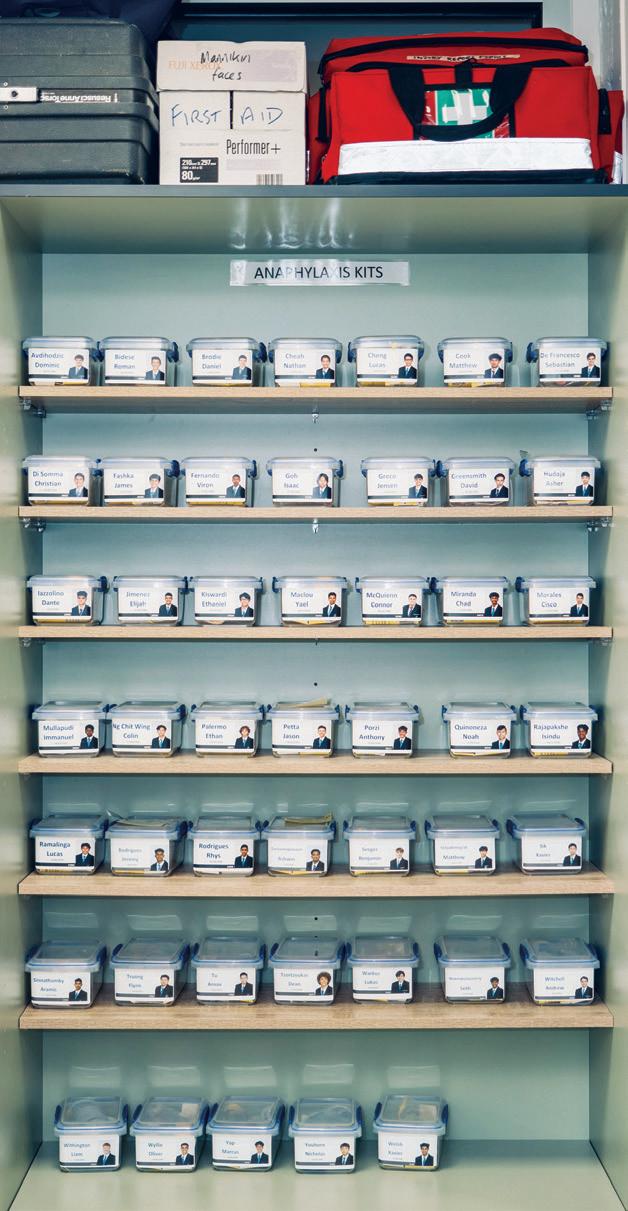
Allergy Action Kits
All students who have a food/insect allergy must have an allergy kit at school.
These are kept in the yellow First Aid boxes in year-level order. Students are also required to keep at second kit in their school bag. There is an anti-histamine (claratyne) tablet included in every First Aid kit.
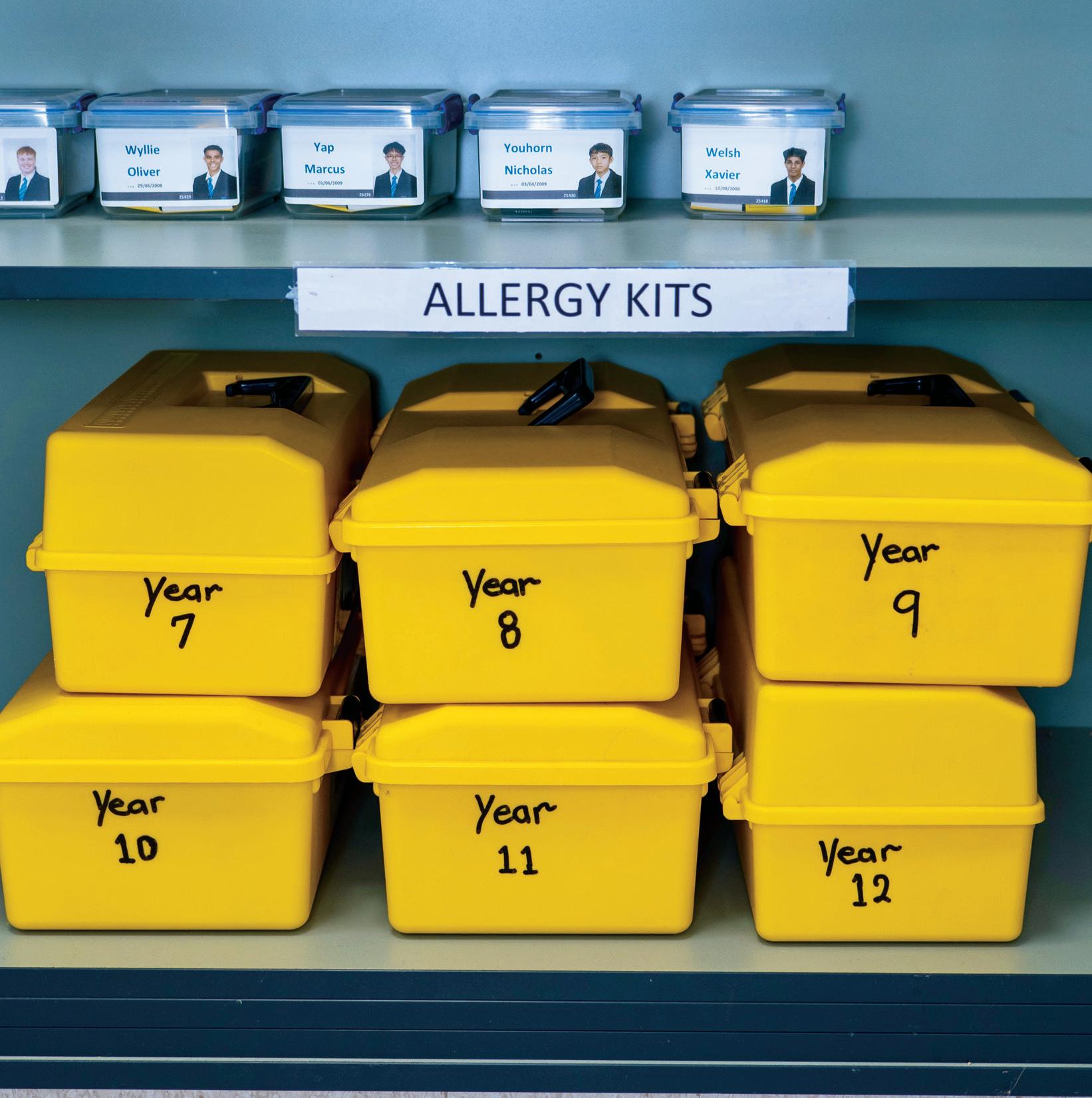
ACTION
PLANS AND KITS
Action Plans
Anaphylaxis Action Plans provide emergency guidelines for identifying and responding to severe allergic reactions, including the administration of adrenaline (EpiPen).
Allergy Action Plans cater to non-anaphylactic allergic responses, detailing appropriate measures to be taken. They serve as educational tools for our staff, enabling them to recognise symptoms promptly and administer immediate treatment.
By incorporating Individual Anaphylaxis Plans, Individual Allergy Plans, and General-Use Anaphylaxis Plans, we ensure personalised care for each student and preparedness for any situation that may arise within, or outside, the school environment.
Asthma Action Plan – as per school policy, every student who has a diagnosis of asthma must have an action plan that is updated annually. There is currently no standard template for asthma action plans.
Spare Ventolin and spacers are located on the silver trolley in the Health Centre, in Asthma Action Kits located around the school, and in every First Aid Kit.
Diabetic & Epileptic students are also required to have an action plan completed by their GP.
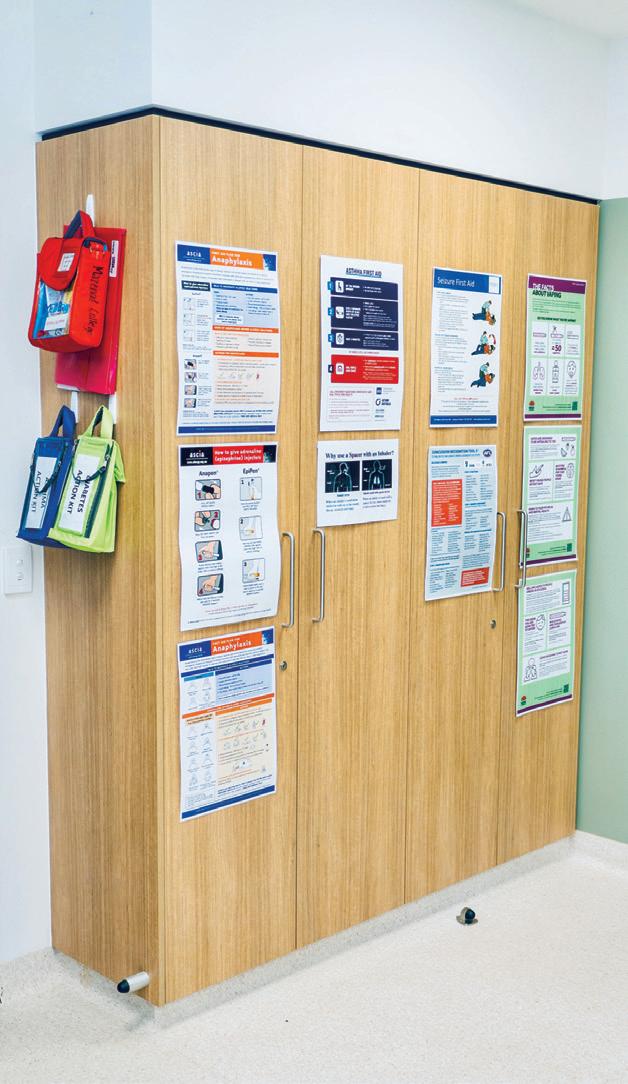
ACTION PLANS AND KITS
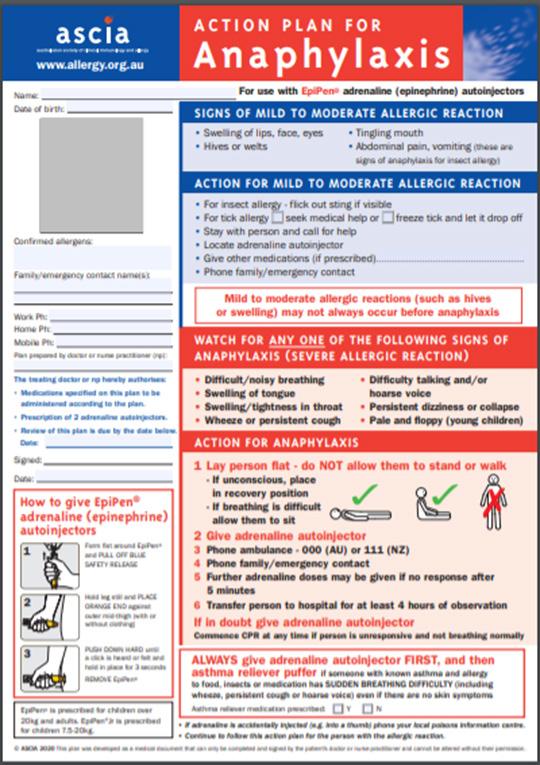
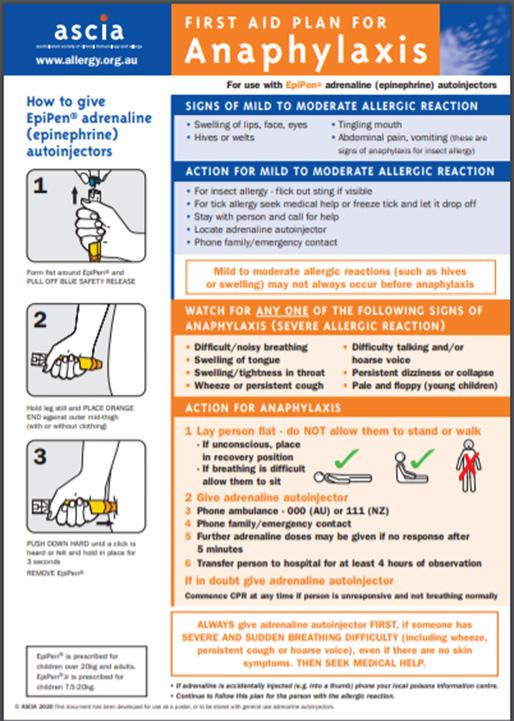
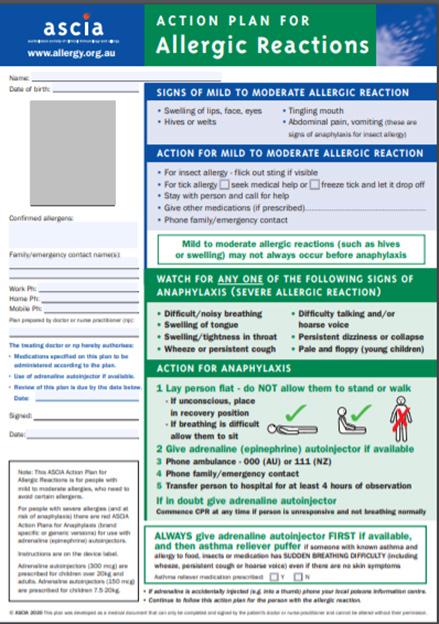
Individual Anaphylaxis Plan Asthma Action Plan
Individual Allergy Plan
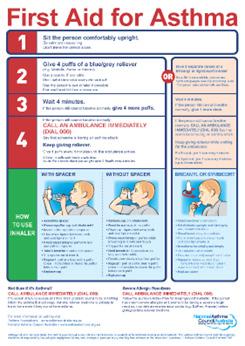
General-Use Anaphylaxis Plan
STANDARD PRECAUTIONS FOR BLOOD / BODY FLUIDS
Standard Precautions are recommended for blood/body fluids from any person. No exceptions should be made.
Please see the following information on standard precautions.
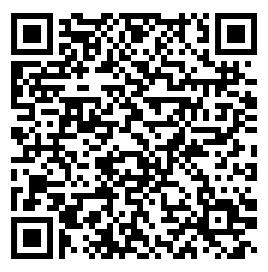
https://www2.health.vic.gov.au/public-health/ infectious-diseases/infection-control-guidelines/ standard-additional-precautions
Use the following procedures when dealing with another person’s blood or body fluids.
1
Wash your hands with soap and water before and after contact.
2
Wear appropriate PPE (personal protective equipment), such as gloves and eyewear.
3
Clean the area with normal saline or water.
4
5
6
Cover with a dressing if appropriate. Apply firm pressure until bleeding ceases (if present).
Dispose of blood/body fluid stained equipment in a manner that will not pose a risk to any other person.
A yellow infectious waste bin is located in the Health Centre, for heavily stained items.
If sharps are involved, ensure they are disposed of safely in a yellow sharps container.
A yellow sharps disposal unit is located opposite the sink in the Health Centre.
IMMUNISATIONS
Immunisations are provided to students in Years 7 & 10.
These immunisations are provided and administered by Monash Council immunisation nurses in accordance with the National Immunisation Program (NIP) Schedule.
Year 7
DTP – Diptheria, Tetanus, Pertussis (whooping cough)
HPV – Human Papilloma Virus
Year 10
Meningococcal ACWY
There are additional immunisations that are recommended for overseas travel. A customised list will be provided to staff and students who are attending these trips, and will be based on the latest advice from the Australian Government.
INFECTIOUS ILLNESSES
There are some members of our community who are immunosuppressed. This puts them at serious risk if they are exposed to infectious illnesses.
In particular: chicken pox, measles, mumps or shingles. If you are diagnosed with any of these illnesses, please inform the nurses ASAP.
EMERGENCY CARE AND FIRST AID
Staff are encouraged to complete a First Aid course. These courses are run onsite biannually by an accredited provider and last for 3 years.
The CPR component must be updated annually.
If you are interested in participating in a First Aid course, please notify the nurses.
If you have previously completed a First Aid course and it is still current, please provide a copy of your certificate to the nurses and we will add you to the First Aider list.
The First Aider list is kept in the Health Centre, Reception, Main Staffroom, and on MazCom.
MazCom → Staff Services → Health Centre
HEALTH AND SAFETY TRAINING
We have some health-related online training courses that are mandatory for staff to complete, and some that are not mandatory but are highly recommended.
Please visit the Health Centre tile on MazCom for links to the online training courses.
MazCom → Staff Services → Health Centre
HEALTH AND SAFETY TRAINING
Mandatory training
Anaphylaxis online training
This must be completed every 2 years, which includes the verification of EpiPen administration which will be done by a designated staff member. You will receive an email with the required links when you are due to update your training.
If you have previously completed this and it is still current, please provide a copy of your signed certificate to the nurses.
Biannual Anaphylaxis briefing
Attendance at the biannual Anaphylaxis briefing, presented by the Health Centre nurses. Your attendance is recorded and you will sign to confirm your presence.
Asthma online training
This course will provide school staff up-to-date information on asthma and its management within the school setting. Most importantly, school staff will be trained in the national protocol for the first aid treatment of an asthma attack. This must be completed every 3 years.
Recommended training
Diabetes online training
Level 1 Introductory training is designed for all school staff and provides basic information about students living with type 1 diabetes. Level 1 training will take approximately 30 minutes to complete. Some staff may be required to undertake Level 2 & 3 training.
First Aid training
The First Aid training is held onsite twice per year. The First Aid Certification lasts 3 years. CPR training must be updated annually.
If you have previously completed this and it is still current, please provide a copy of your signed certificate to the nurses.
Staff should inform their manager and the nurses of medical conditions for which they may require treatment for, or assistance with, while at work.
A confidential staff medical information form can be completed which includes emergency contact details. This information will be entered into Synergetic where it can only be viewed by the nurses. This can be printed off to give to paramedics should they be required.
All such information provided to the nurses is treated with medical confidentiality.
September 2024 revision. This is a controlled document. Visit the MazCom, or use the QR code below, for the latest version.
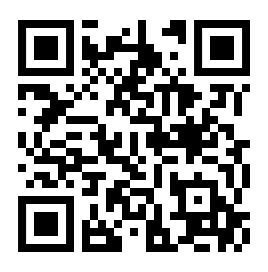
https://mazcom.mazenod.vic.edu.au/ homepage/3631
